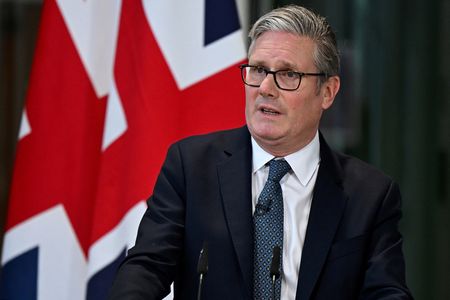By Virginia Furness and Marc Jones
LONDON (Reuters) -The G20’s financial stability watchdog delivered a new plan on how to tackle climate risks on Monday, but paused further policy work amid a retreat by the United States that has tested efforts to advance a united financial policy on climate-related risks.
The U.S. has withdrawn from multiple groups dedicated to exploring how flooding and wildfires and big climate-related policy shifts could impact financial stability.
In its medium-term plan, the G20’s Financial Stability Board pledged to step up coordination and data sharing on climate-related financial risk.
However, it said while progress had been made to integrate climate risks into financial systems, some of its members, who include central bank governors and ministers, were keen to pause further climate work.
“While many members feel there is a need for more work, some members feel that the work completed to date is sufficient,” the FSB said in an update to its 2021 climate roadmap delivered to G20 finance ministers meeting in South Africa.
“Going forward, the FSB will … make determinations about what projects, if any, it will undertake.”
U.S. Treasury Secretary Scott Bessent would not attend the G20 meeting, Reuters reported last week. The United States is due to head the G20 group, which it helped found in the aftermath of the global financial crisis, next year.
The FSB said it would continue to consider climate-related topics each year and would focus on its role as a coordinator of international work on climate risks.
The watchdog said it did not have plans to do any more significant policy work on integrating climate-related financial risks into its supervisory and regulatory work. Work on this topic is ongoing at many of its member institutions, it said.
The Brussels-based think tank Finance Watch said a lack of reference to concrete regulatory measures needed to address climate risks was a sharp retreat from the G20’s original ambition and a moment of multilateral backsliding.
“It confirms what we’ve been hearing since the G20 Plenary in Madrid (in June): the FSB is backing down under pressure, especially from the U.S.,” it said in a statement.
“If the G20 endorses this shift, we risk locking in a fragmented response. That weakens incentives for lagging jurisdictions (and) reduces multilateral pressure to act,” its head of research and advocacy, Julia Symon, added.
Earlier this year, the FSB published work on the usefulness of transition plans for financial stability and in 2024 presented a stocktake of supervisory and regulatory work on nature-related financial risks.
“Rather than identifying such vulnerabilities a priority for further work, the FSB will leave that decision up to its annual work programme process,” the FSB said in the report.
The report detailed progress made since 2023 by international standard setters and global banking regulators.
It also set out efforts to provide forward-looking data to help banks and companies quantify economic losses from climate shocks such as heatwaves.
(Additional reporting by Marc Jones;Editing by Ros Russell)











